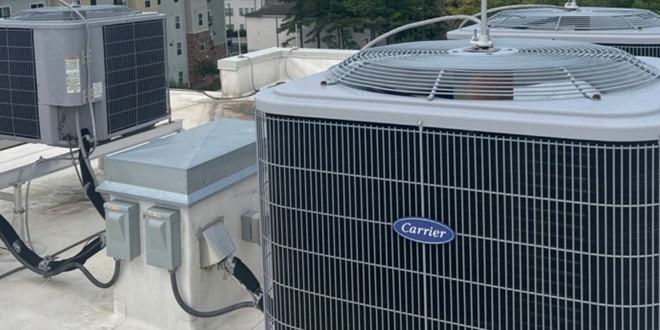In Baton Rouge, LA, selecting the right HVAC system is crucial for home and business owners seeking comfort and efficiency. This guide will explore the main types of HVAC systems, helping you make an informed decision before your purchase.
- Split Systems:
- Description: The most common type, split systems have separate indoor and outdoor units.
- Components: Includes an outdoor unit with a compressor and condenser, and an indoor unit with an evaporator coil and blower.
- Best For: Ideal for homes with existing ductwork.
- Heat Pumps:
- Description: Heat pumps are efficient systems that provide both heating and cooling.
- Types: Air-source heat pumps (extract heat from air) and geothermal heat pumps (extract heat from ground or water).
- Best For: Suitable for mild climates; geothermal options are great for energy efficiency.
- Packaged Central Air Conditioners:
- Description: These systems have a single outdoor unit that contains both the compressor, condenser, and evaporator.
- Best For: Ideal for homes with limited space for indoor units.
- Ductless Mini-Split Systems:
- Description: These systems provide direct air conditioning and heating to individual rooms.
- Components: Consists of an outdoor compressor unit and one or more indoor air-handling units.
- Best For: Perfect for homes without ductwork, room additions, or specific zoning needs.
- Hybrid Systems:
- Description: Hybrid systems use a combination of a gas furnace with an electric air-source heat pump.
- Best For: Excellent for maximizing energy efficiency and reducing costs.
- Furnaces:
- Description: Furnaces provide heating by warming air in one area and distributing it through the house using ductwork.
- Types: Gas, electric, and oil furnaces.
- Best For: Ideal for colder climates and can be used in combination with air conditioning systems.
- Boilers:
- Description: Boilers heat water and provide either hot water or steam for heating. Steam is distributed via pipes to steam radiators, and hot water can be distributed via baseboard radiators or radiant floor systems.
- Types: Gas and oil boilers.
- Best For: Great for homes needing efficient and comfortable radiant heat.
- Custom Solutions:
- Description: For unique spaces or specific needs, custom HVAC solutions can be designed.
- Best For: Commercial properties or homes with special requirements.
Considerations When Choosing an HVAC System:
- Climate: The Baton Rouge climate can influence the best type of system.
- Energy Efficiency: Look for systems with high SEER (Seasonal Energy Efficiency Ratio) ratings.
- Size and Layout of Property: Ensure the system is appropriately sized for your space.
- Budget: Consider both the upfront cost and long-term energy savings.
Optimal HVAC Systems for Baton Rouge, LA Climate
Baton Rouge, Louisiana, experiences a humid subtropical climate characterized by hot, humid summers and mild winters. This unique climate demands an HVAC system that not only cools efficiently during the sweltering summer months but also provides adequate heating during the cooler winter days. Here are the best HVAC systems for this local climate and the reasons why they are suitable:
- Split Systems:
- Why Suitable: Split systems are highly efficient for Baton Rouge’s climate. The separate indoor and outdoor units allow for effective cooling during hot summers and sufficient heating in mild winters. Their adaptability makes them a popular choice for consistent, year-round comfort.
- Heat Pumps (Especially Air-Source Heat Pumps):
- Why Suitable: Air-source heat pumps are particularly effective in the mild winter conditions of Baton Rouge. They work efficiently by transferring heat rather than generating it, making them more energy-efficient, especially in moderate climates. During the hot summers, they reverse the process, providing cool air.
- Ductless Mini-Split Systems:
- Why Suitable: For homes without existing ductwork or for room additions, ductless mini-split systems offer a flexible solution. They provide targeted heating and cooling, which is beneficial in a climate where some days may require air conditioning and others, heating.
- Hybrid Systems:
- Why Suitable: Hybrid systems, which combine a gas furnace with an electric air-source heat pump, offer the best of both worlds. They are energy-efficient in mild weather when the heat pump is operational and switch to the furnace during the occasional cold snaps, ensuring comfort and cost-effectiveness.
- Packaged Central Air Conditioners:
- Why Suitable: For homes with limited space that still require effective cooling and heating, packaged central air conditioners are ideal. These systems are efficient in managing the high humidity and temperatures of Baton Rouge summers.
- Furnaces (Gas and Electric):
- Why Suitable: While Baton Rouge winters are generally mild, a furnace can provide the necessary warmth on colder days. Gas furnaces are efficient and a popular choice, but electric furnaces can be suitable for homes without natural gas access.
In summary, the ideal HVAC system for Baton Rouge should prioritize efficient cooling capabilities to handle the high humidity and heat, while also providing sufficient heating for the cooler winter months. Energy efficiency and the ability to maintain consistent indoor air quality are key factors in this climate. Homeowners should consider these aspects along with their specific needs, such as the presence of ductwork and space availability, when selecting an HVAC system.
FAQ: Choosing the Right HVAC System for Your Home or Business
- What factors should I consider when choosing an HVAC system?
- Answer: Consider the size of your space, the local climate, energy efficiency ratings, your budget, and specific heating and cooling needs. It’s also important to think about the existing infrastructure, like ductwork in your home or business.
- How do I know what size HVAC system I need?
- Answer: The size of the HVAC system should be based on the square footage of your space, insulation levels, window types, and layout. A professional HVAC technician can perform a detailed assessment to determine the appropriate size.
- Are energy-efficient HVAC systems worth the investment?
- Answer: Absolutely. While they may have a higher upfront cost, energy-efficient systems can significantly reduce your monthly utility bills and have a lower environmental impact.
- Should I choose a ducted or ductless system?
- Answer: Ducted systems are ideal if you already have existing ductwork. Ductless systems are a great option for additions, smaller spaces, or areas where installing ductwork is impractical.
- What is the difference between a heat pump and a traditional furnace or air conditioner?
- Answer: Heat pumps provide both heating and cooling by transferring heat in or out of your home. Traditional furnaces only provide heating, and air conditioners only provide cooling. Heat pumps are generally more energy-efficient, especially in milder climates.
- Can I install an HVAC unit myself?
- Answer: HVAC installation is complex and typically requires professional installation to ensure safety and efficiency. Improper installation can lead to increased energy costs and reduced lifespan of the system.
- How long does an HVAC system last?
- Answer: The lifespan of an HVAC system varies but typically ranges from 15 to 25 years, depending on the type of system, maintenance, and usage patterns.
- What maintenance does your heating and cooling system require?
- Answer: Regular maintenance includes changing or cleaning filters, inspecting and cleaning ducts, checking the thermostat settings, and ensuring the outdoor unit is free of debris. It’s recommended to have a professional checkup at least once a year for your cooling or heating system.
- Is it better to repair or replace an old HVAC system?
- Answer: This depends on the age of the system, the cost of repairs, and its current efficiency. If your system is over 10 years old and frequently needs repairs, it might be more cost-effective to replace it.
- How do I choose the right HVAC contractor?
- Answer: Look for licensed and insured contractors with good reviews and a strong reputation in your community. Ensure they offer a warranty and can provide detailed, transparent quotes.
Ready to Upgrade Your Comfort?
?️?Choosing the right new HVAC system is a breeze with Fire and Ice Heating & Air. Our expert team in Baton Rouge, LA, is here to help you select the perfect system for your home or business. Let us guide you through the options and find a solution that fits your needs and budget. Contact us today for a consultation and take the first step towards enhanced comfort and efficiency! ???



